Jul 2009
Jul 2009 sadminA HELPING HAND TO EMERGING FARMERS
A HELPING HAND TO EMERGING FARMERS sadmin For Joseph Modise, falling milk prices, the present economic crisis and a lack of business skills meant one thing - to forget about his dream of 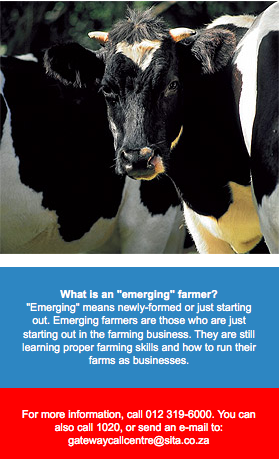 becoming a successful dairy farmer. But when the Centre for Excellence in Agriculture for Emerging Farmers was started in Heidelberg, Gauteng, he changed his mind. The centre was opened in February this year to give a helping hand to new and struggling farmers.
becoming a successful dairy farmer. But when the Centre for Excellence in Agriculture for Emerging Farmers was started in Heidelberg, Gauteng, he changed his mind. The centre was opened in February this year to give a helping hand to new and struggling farmers.
Joseph Modise was struggling to make a living from his dairy farm due to a lack of proper skills. But Modise, who is a land-reform beneficiary, now has an opportunity to get specialised training in farming and business skills. This is due to programmes offered by the new Centre for Excellence in Agriculture for Emerging Farmers.
The Ministry of Agriculture and Land Affairs started the Centre. The aim is to empower emerging farmers through skills training, mentoring and funding. It includes forming partnerships between successful commercial farmers and small-scale developing farmers.
The centre will also help women and young people interested in farming to link up with commercial farmers.
Empowerment project
The centre is a project between white commercial farmers, represented by the South African Cattle Exchange (SACE), and black emerging farmers, represented by the National African Farmers' Union (NAFU).
Other organisations involved include Women in Agriculture and Rural Development (WARD) and Youth in Agriculture and Rural Development (YARD), as well as local subsistence farmers.
The centre will focus on:
- identifying emerging black farmers, including women, youth and land-reform beneficiaries, who show promise of becoming commercial farmers
- training of these farmers
- finding land and loans for the graduates to start their own businesses
- ensuring that graduates get 24-hour mentoring at the centre
- linking up new graduates with markets like big food manufacturing companies.
Training
Apart from training emerging black farmers, the centre will also train other struggling dairy farmers, pig farmers and grain producers.
The Agricultural Research Council (ARC) will help with the training of the centre's staff.
Latest technology
The centre will use the latest farming and business technology. It will include taking records of how dairy cows perform, setting production goals and applying proper reproduction methods.
The department believes that the partnership between commercial farmers and emerging farmers will play an important role in developing successful farming businesses. It will also help beneficiaries of land-reform programmes to use their land productively.
The aims of the centre are in line with government's policy of skills development.
- Mbulelo Baloyi
A NEW ERA IN YOUTH DEVELOPMENT
A NEW ERA IN YOUTH DEVELOPMENT sadminYouth development is a critical focus area for our government, said President Jacob Zuma at the launch of the new National Youth Development 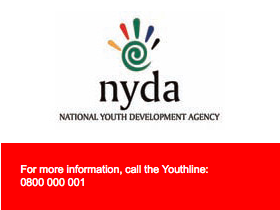 Agency (NYDA). The new agency will usher in a new era in youth development, he said.
Agency (NYDA). The new agency will usher in a new era in youth development, he said.
The NYDA was launched as South Africa commemorated Youth Day on 16 June, marking the 33rd anniversary of the Soweto uprisings in 1976.
The NYDA was formed when the National Youth Commission and Umsobomvu Youth Fund were joined. It was started following the approval of the National Youth Policy (NYP) 2009 - 2014. The policy will guide government and social partners in working together to promote and speed up youth development programmes.
Economic opportunities
The NYDA will link up unemployed young graduates with economic opportunities. It will strengthen efforts to expand the National Youth Service Programme and support young entrepreneurs.
It will expand opportunities for skills development, targeting the youth and ensuring better access to decent work opportunities.
Guided
Young people will also be guided to play a role in poverty alleviation, rural development, crime prevention and reducing HIV and AIDS. Plans are underway to recruit and deploy thousands of unemployed youths in the fight against crime in communities.
The NYDA will have offices at the three spheres of government, namely national, provincial and local government levels.
BRIGHTENING UP LIVES WITH ELECTRICITY
BRIGHTENING UP LIVES WITH ELECTRICITY sadminIt is unusual to find a woman doing a dangerous job like maintaining electricity wires. But for Mabu Asnath Phalane, this kind of work is her income and pride.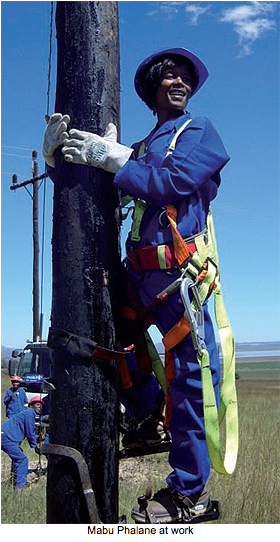
Brightening up lives with electricity Phalane, a 31-year old mother of two, is the proud owner of an electrical company in Newcastle, northern KwaZulu-Natal.
What she enjoys most about her job is brightening up people's lives by bringing electricity to rural areas where communities had to make do without it in the past.
Main task
Phalane's company, called Phindulo Trading, builds high-voltage power lines and provides other electricity-related services for Eskom. These include maintaining power lines and sub-stations, as well as installing transformers.
Their main task is to install electricity in various parts of northern KwaZulu-Natal and in Mpumalanga. They start with the basic things needed to connect households to the electrical grid. This includes digging holes, planting poles and putting in lines and transformers.
Farming
At first, electricity was not Phalane's area of interest. She wanted to be a farmer. She studied agriculture and graduated with a diploma in animal production. But growing up in a rural area without electricity sparked her interest to follow a career in electricity.
Having first-hand experience of not having electricity at home, Phalane is aware of the difficulties these communities face. "You have to collect firewood in the veld. At night you cannot study properly because you have to use a candle," she said.
"My brother is an electrical engineer and I became interested in what he was doing, so I decided to enroll for an electrical course."
Bringing joy
"When you know people had been working on a farm for almost 20 years without electricity, and you see their joy when you bring it to them, you feel that you are making a difference in their lives," Phalane said.
She started her business using her own savings to buy a second-hand truck, equipment and protective clothing. After struggling to make ends meet for three years, Phalane applied for funding from the Umsobomvu Youth Fund.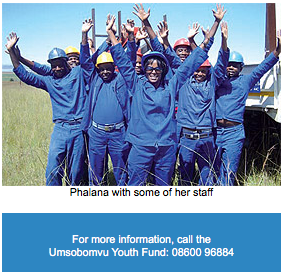
"With the money I got from the fund, I could buy brand new equipment and a new eight-ton truck. Now everything is running smoothly and I manage to complete my jobs on time."
Job creation
an industry dominated by men, Phalane said. But knowledge of the work has helped her earn the respect of her male employees. She employs 18 permanent staff who are qualified to work with electricity.
Her plans for the future include growing her company so that it can create more jobs in the electrical industry, especially for young women.
- Mbulelo Baloyi
COLOUR CODES FOR EASIER SEATING
COLOUR CODES FOR EASIER SEATING sadminWhen attending 2010 World Cup matches, we have to be aware that FIFA has certain rules that must be followed. The rules are there to make arrangements easier for fans, as well as for officials. These  include seating arrangements like matching colour codes for seats and tickets.
include seating arrangements like matching colour codes for seats and tickets.
The first important rule at FIFA World Cup matches is that soccer fans must make sure they have the correct ticket for the match they will be watching. They should also be on time and make sure that they sit on the specific seat number shown on the ticket.
Types of tickets
Soccer fans must remember that NO TICKETS WILL BE SOLD AT STADIUMS. No one will be allowed in the stadiums if they have a wrong ticket or no ticket.
You can buy a maximum of four tickets per match for up to seven matches. There are four different types of tickets. These tickets have different prices. This is why it is important that people sit on the seat number shown on the ticket. To make it easier for people to find their seats, the seats have different colours. The colours will also be shown on the tickets.
Stadium colour coding
All the stadiums will be colour coded in the same way to make sure that they look similar. This will ensure that people will not be confused when going to stadiums around the country to watch different matches.
FIFA has used the colour-coding process at previous World Cup tournaments and found that it worked very well
Seating colours
[ BLUE ] Main Stand:
This stand has blue seats and is reserved for the media, as well as certain important people. These are the most expensive tickets and will usually be sold out long before the matches take place.
[ GREEN ] Back Stand:
The Back Stand has green seats and is the stand opposite the Main Stand. This stand is known to be the best place to watch the matches because it has a good view. The tickets are also expensive, but will be easier to get than those for the Main Stand.
[ RED ] Home Stand:
The Home Stand has red seats and is on the left-hand side, behind the goal posts on the left. The Home Stand is not as expensive as the Main Stand or the Back Stand, but is more expensive than the Away Stand.
[ YELLOW ] Away Stand
The Away Stand has yellow seats and is on the right-hand side behind the goal posts on the left. Tickets for the Away Stand are the cheapest.
DON'T LET DRUGS AND ALCOHOL DESTROY YOU
DON'T LET DRUGS AND ALCOHOL DESTROY YOU sadminThe youth are the future leaders of our country. But drugs and alcohol are destroying them. Alcohol, cigarettes and drugs are not only costly, but it can kill you.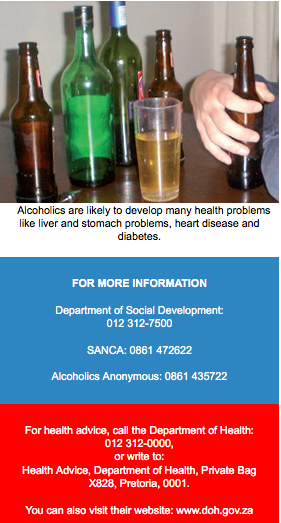
Alcohol has become a huge problem among our youth. Many young people start drinking because of peer pressure or because they think drinking will solve their problems. This often becomes a habit, which turns to alcoholism.
Alcoholics are likely to develop many health problems like liver and stomach problems, heart disease and diabetes. They are also at a higher risk of suffering from high blood pressure, and gout. In addition, alcohol makes people act irresponsibly, which can cause accidents, abuse and unsafe sex.
People who drink a lot of alcohol, age 10 times faster than people who don't drink too much.
Cigarettes
Cigarettes are made from tobacco. Tobacco is addictive and dangerous. If you start smoking at a young age you are most likely to be addicted for a lifetime.
Cigarettes cause lung cancer and TB. Cigarettes also affect blood circulation leading to breathing and heart problems. In addition, tobacco smoking increases the chances of a stroke, and makes pneumonia and asthma worse because of difficulties with breathing.
A recent health study shows that 21 per cent of South African teenagers are smokers. These teenagers do not only harm themselves, but also those around them. This is because breathing in smoke from someone else's cigarettes (called second-hand smoke or environmental tobacco smoke) is also very harmful.
Dagga
Dagga is an illegal drug in South Africa and is linked to many mental illnesses. The Department of Health says that about 18,9 per cent of South African youth smoke dagga. Many learners even smoke dagga at school.
Like cigarettes, dagga smoking also increases the chances of getting lung cancer and TB. Dagga smokers tend to develop breathing problems and cough a lot.
Dagga is most dangerous when smoked by young teenagers. Young boys delay their puberty and young girls disturb their menstrual cycle when they smoke dagga. It also affects learning ability, because young people who smoke dagga develop problems with memory and concentration. They cannot think clearly after smoking dagga, they hear sounds and see things that are not there.
A healthier nation
A healthier nation is a richer nation. Stop abusing substances like alcohol, cigarettes and dagga. This will prevent deaths as a result of cancer, heart diseases and other lung infections.
- Carol Netshifhefhe
FIGHT AGAINST HIV AND AIDS SHOWING RESULTS
FIGHT AGAINST HIV AND AIDS SHOWING RESULTS sadminAbout 5,2 million South Africans were living with HIV in 2008. But national efforts by government and various stakeholders to fight HIV and 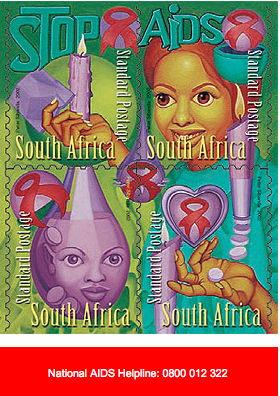 AIDS is showing positive results. A study by the Human Sciences Research Council (HSRC) shows that South Africa's HIV and AIDS figures are stable and there are signs that fewer children and teenagers are being infected. This could be the result of efforts to fight HIV in early childhood through programmes like the prevention of mother-to-child transmission.
AIDS is showing positive results. A study by the Human Sciences Research Council (HSRC) shows that South Africa's HIV and AIDS figures are stable and there are signs that fewer children and teenagers are being infected. This could be the result of efforts to fight HIV in early childhood through programmes like the prevention of mother-to-child transmission.
The study further shows that HIV among people aged 15 to 49 has dropped between 2002 and 2008 in the Western Cape, Gauteng, Northern Cape and the Free State. The largest drop was by 7,9 per cent in the Western Cape. The study also shows a drop in new infections among teenagers aged 15 to 19 years. New infections in the age group below 20 years dropped from 2 per cent in 2002 to 1,7 per cent in 2008. South Africa is currently implementing the largest antiretroviral treatment programme in the world.
- BuaNews
FLY OUR FLAG WITH PRIDE!...
FLY OUR FLAG WITH PRIDE!... sadminPLEASE NOTE:
The games on this page are not a competitions. They are only for fun, so don't send your answers to Vuk'uzenzele.
South Africa's bright and colourful flag is a well known sight at public places all over the country. It is also often seen in other countries where South Africa is represented like at sports events where our teams compete internationally. The South African national flag first flew on 10 May 1994 - the day Nelson Mandela was inaugurated as South Africa's first democratically elected president. This was two weeks after the country's first democratic elections on 27 April 1994.
What you should know about our flag
I The country's flag must always be treated with dignity and respect.
It must never hang upside down or be allowed to touch the ground or floor.
An upside down flag is the traditional sign of surrender or if you are at sea, it is an international sign to show that a ship is in distress!
When the flag is displayed horizontally, the black triangle should be to your left. The red band must be at the top and the blue band at the bottom. If the red band is at the bottom, the flag will be flying upside down.
When draped vertically, the black triangle must be at the top and the red band on the left.
The flag should be hoisted (raised) at the start of the working day and lowered again at or before sunset. It should not remain flying at night unless it is properly lit up.
Did you know?
The South African flag is the only six-coloured flag in the world
Odd One Out
All the words below are found on this page except one. Circle the odd one out
Print the image below to complete this game...

CLICK HERE FOR THE ANSWER
Colour the flag & fill in the missing words

CLICK HERE FOR THE ANSWER
GIVE US A PIECE OF YOUR MIND
GIVE US A PIECE OF YOUR MIND sadminWINNING LETTER
Don't be afraid to report crime!
We can only combat crime in this country if we work together and report crime as it is. Crime is committed every day all over South Africa, but people decide to stay silent. We must not be afraid to report those who commit crime, because they are destroying our beloved country. I urge all my fellow citizens to report whoever is committing crime whether it is your sisters, brothers, parents, employers or our leaders, no one is above the law.
We are hosting the biggest soccer event in the world next year and if we don't combat crime we will regret it. So let us all work with the police and security companies to win this battle against crime.
- Sipho Kubayi, Mkhuhlu, Mpumalanga
Remember your roots
It seems as if many South Africans are not proud of their cultures any more.
Some young people even seem to hate their languages. But please don't criticise your mother tongue; rather learn from older people. Remember, cultures were passed on by our ancestors.
These days it seems parents are afraid to teach their children about their roots. I encourage people to remember where they come from.
- Lesley Ruiters, George, Western Cape
Corruption doesn't pay
We should not live dishonest lives. A lot of people see corruption as a way of life. They see that others have "succeeded" by stealing people's money and buying off criminal cases. This only feeds the corruption monster.
Many people think that corruption is a better and easier way of doing things, because it is sometimes very frustrating to do things the right way.
People who do corrupt things are those who are impatient and want an easy way out. However, wise people know that in life you cannot jump the queue and expect to win.
- Belinah Tenyane, Sebokeng, Gauteng
Be willing to give
It is sad to see most unemployed people in our country giving up and putting all the blame on government. Before asking what the government is doing for you, think what you can do for the economy of this country. People should not always want to receive things from other people; they must also be willing to give.
I think it is wise for people to volunteer in companies or in government so that they can get the necessary experience to find jobs. If you have business ideas, use it and be determined - you will succeed.
- C A Choma, Ga Masha, Limpopo
Every job is important
People have a tendency to look down on other people because of the jobs they do. But every job that we do is important, for example taking out dustbins, working in the road, domestic work, farm work and building.
Those people who look down on others because they think they are doing high-class work, can't even spend a day doing these people's jobs properly.
As Africans with a spirit of ubuntu, let's appreciate and respect everyone in his or her job. We are all building our country together and everyone is contributing to the economic growth.
- Sinah Mathabatha Mogau, Chuenespoort, Limpopo
Children are the future
People are forgetting that children are the future. They are the leaders of tomorrow. Children are the most precious gift to the world. It is not fair what we read in newspapers about the constant acts of violence and abuse towards children - it is a disgrace!
Children should be protected not neglected or made to believe that they are worthless. Lets us help those children that live on the streets. They are so-called "street kids", but no street gave birth to a child and no child deserves to stay on the streets. Help children to reach their dreams and STOP abusing them.
- Jabulani D Motshweleka, Kwaggafontein, Mpumalanga
You gave me hope
I am a 54-year old lady. I never saw the purpose of me going to school, because I thought I was too old. I thought that it would be useless for such an old lady to attend school. Vuk'uzenzele came into my life at the right time. It showed me that no matter how old you are, education is very important. I am now proud to say I have completed my ABET training. Vuk'uzenzele gave me hope. Thank you Vuk'uzenzele for healing the scars in my soul.
- Julia Gcobokazi Mhlungulwana, Sterkstroom, Eastern Cape
Thank you for the Braille
I am a blind girl in Grade 9 and my dream is to be a musician. But as blind people we don't have lots of opportunities. The money is scarce and we struggle to buy the equipment we need, like computers with voice and Braille machines, because it is so expensive.
Thank you for the Braille edition of Vuk'uzenzele. I enjoy reading the magazine in Braille because I have learned from it that if you want something you must believe in yourself. Now I believe in myself and I have hope for the future. I believe that one day I will achieve my goal and have my own equipment.
- Mapule Portia Mochongwane, Klerksdorp, North West
Where is our self respect?
Be substance wise - say no to drugs and alcohol. It is so sad to see young boys and girls drinking alcohol in the streets. Where is our self respect? Guys, let's rather choose to build up our country by being positive, wise and drug free.
There is no stability in drugs and alcohol - they don't guarantee a good life, they are toxic and they destroy our health and our future, they are a waste of money and lead us to do wrong things in life. Think of the bigger picture, think of your future and your dreams. Appreciate your health and your body, have self respect and stay away from these toxic substances.
- Tebogo Sebopa, Polokwane, Limpopo
Don't let anything destroy your future
I am 15 years old and a Grade 11 student at Msobomvu High School in Butterworth. I am not going to let anything destroy my future. I have a dream that keeps me away from drugs and alcohol. My goal is to be a doctor so that I can help reduce the number of people who are infected by diseases. I want to say to the young people of South Africa: stay away from drugs and never give up on your goals and dreams.
- Dube Sisipho, Butterworth, Eastern Cape

KEEPING IT BRIEF
KEEPING IT BRIEF sadminGAUTENG
The provincial government's key focus areas for the next five years are job creation, education, health, rural development and the fight against corruption and crime.
As part of its commitment to fight corruption, the provincial government is putting measures in place to review the tender system. This will ensure that public servants and elected representatives do not abuse the state through corrupt practices.
- BuaNews
MPUMALANGA
To ensure better education in the province, the Eastern Cape Department of Education will get rid of 860 mud schools over a period of three years and replace them with proper school buildings. Currently, 316 new schools are being built. 258 of these will be completed during this year and handed over to communities.
- BuaNews
LIMPOPO
Over the next five years, the provincial government will increase the number of adult basic education and training (ABET) centres by 45. This forms part of the province's commitment to provide everyone with education. The province will also rebuild 188 run-down schools, upgrade 51 schools, repair 102 damaged schools and equip 109 schools with electricity. 3 200 public schools will get new computers and learners will get training in computer literacy.
- BuaNews
KWAZULU-NATAL
As part of plans to improve the province's economy and create jobs, the provincial government started a programme to market the province as a destination of choice for international visitors. The province is currently the third largest destination in the country for international tourists. Last year, its tourism industry made R22 billion profit. The industry currently employs about 144 000 people.
- BuaNews
KWAZULU-NATAL
Over 400 high schools in the province's poorest areas will soon be able to provide meals to their learners through government's nutrition programme. The provincial education department put aside R555 million for this purpose. The programme, which started in primary schools, is currently providing meals to 3 924 primary schools in the province. The department aims to provide meals to all poor schools in the province regardless of whether they are primary or secondary schools.
- BuaNews
NORTH WEST
The provincial government has committed itself to uplift its youth by working together with the new National Youth Development Agency (NYDA), as well as other youth organisations. They are putting plans in place to help youth tackle problems like HIV and AIDS, unemployment, poverty, access to health care and education, child abuse and human trafficking.
- BuaNews
NEW UNIT WILL CRUSH ORGANISED CRIME
NEW UNIT WILL CRUSH ORGANISED CRIME sadminThe new Directorate for Priority Crime Investigations (DPCI), will take over the criminal investigative work of the former Directorate of Special Operations (DSO).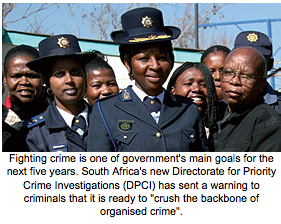
The DSO was also known as the Scorpions, which closed down at the end of June. The Scorpions were formed in September 1999 under the National Prosecuting Authority (NPA).
Serious crimes
The new unit will investigate serious crimes like organised crime, fraud and corruption, as well as crimes against the state and other economic crimes.
The new team will take over more than 600 investigations which were previously conducted by the Scorpions.
Strict selection
Strict selection processes have been put into place to screen staff for the new unit. Applicants must be approved by the Police's Crime Intelligence Division before being appointed.
So far, of the 221 special investigators who were in the Scorpions, some 137 have joined the new unit. Former Western Cape deputy police commissioner, Anwar Dramat, is heading the new crime-fighting unit.
Proper equipment
The new unit will get proper equipment and facilities to ensure that it does its work properly.
The unit will have a close working relationship with the prosecutors and intelligence agencies, as well as with other state institutions. These include the Asset Forfeiture Unit, customs, state-owned enterprises, and private forensic investigators.
Lawyers and police
The new unit will also have lawyers who will be part of all investigations. They will provide legal guidance from the beginning of an investigation. This will help them to make up proper case dockets to increase the chances of successful prosecution.
In addition, the new unit will get full support from the Police's Crime Intelligence Division.
If there are complaints against the unit, the Minister of Police may appoint a retired judge to deal with it. The unit's powers will be properly checked to prevent abuse of power.
- Mbulelo Baloyi
New government departments to help carry out goals
- Following the general elections in April, a new structure has been set up for Cabinet. New government departments will help the new administration to carry out its policies correctly.
- A National Planning Commission and a new Department for Performance Monitoring and Evaluation and Administration has been set up in the Presidency.
- The Department of Minerals and Energy has been divided into two separate departments of Mining and Energy.
- The Department of Education has been divided into two, namely Basic Education and Higher Education and Training.
- The Department of Housing is now called the Department of Human Settlements.
- A new Department of Rural Development and Land Reform has been set up.
- The Department of Water Affairs was joined with Environmental Affairs to form the Department of Water and Environmental Affairs. The Forestry section of the old department was joined with Agriculture and Fisheries to form the Department of Agriculture, Forestry and Fisheries.
- A new Department of Tourism and a new Department of Economic Development was set up.
- The Department of Provincial and Local Government was changed to Cooperative Governance and Traditional Affairs.
- The Department of Defence was changed to Defence and Military Veterans.
- A new Department of Women, Youth, Children and People with Disabilities has been formed.
-
The Department of Foreign Affairs was changed to the Department of International Relations and Cooperation.
PREPARING YOUTH FOR THE FUTURE
PREPARING YOUTH FOR THE FUTURE sadminGrowing up in informal settlements in the Ekurhuleni area has not prevented a group of young people from developing their skills. The training they got from a local hotel has made a huge difference in their 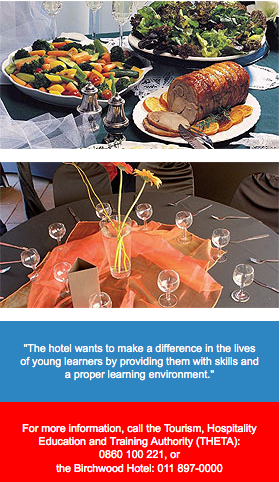 lives. They can use their new skills during the 2010 World Cup and into the future.
lives. They can use their new skills during the 2010 World Cup and into the future.
In the spirit of the 2010 World Cup, the Boksburg-based Birchwood Hotel and the OR Tambo Conference Centre has been training young matriculants in various skills. These range from hospitality to information technology.
The hotel worked in co-operation with the Department of Labour's Sector Education and Training Authorities (SETAs).
Invest in the youth
The youths are from the informal settlements of Ulana, Kanan, Angelo, Jerusalem and Delmore in the Ekurhuleni metropolitan area. Together these settlements are known as Ukajede.
"Instead of complaining about crime and doing nothing, as a hotel group we made a decision that we would invest in educating young people," said Ukajede Project co-ordinator Thomas Klein.
"We did this because we were fully aware that some of the social problems, such as the high crime rate, are due to a lack good education and skills," he said.
Créche
"The hotel wants to make a difference in the lives of young learners by providing them with skills and a proper learning environment to prepare them for the future," Klein said.
They also run créche projects for small children, and have funded the school fees of some matriculants. Some of the learners are now working at the hotel in jobs like receptionists, guest relations and waitering.
This is not only helping the youths with jobs and new skills, but also benefits the hotel as it provides them with trained staff.
In anticipation of more people visiting our country for the 2010 World Cup, it will give the youths the necessary experience to find jobs in the tourism industry.
Learnership
One of the learners is 21-year old Marcelo Modise. He is a computer science student in his second year of study. He is now doing a learnership with the information technology department of the hotel. This is done with the help of the Information Systems, Electronics and Telecommunications Technologies (ISETT) Seta.
"The learnership at the hotel has helped me a lot in my computer studies as I am able to practice what I am being taught at college," Modise said. To help him with his daily needs, Modise gets a monthly allowance.
Create jobs
The hotel also recruits non-skilled labour from the informal settlements. The goal is to create jobs while at the same time supporting youths to further their studies at centres of higher learning.
- Mbulelo Baloyi
REACHING HER SKY-HIGH DREAM
REACHING HER SKY-HIGH DREAM sadmin'Fighting for your dream no matter what,' is the motto Zoliswa Gila lived by for most of her life. It is because of this attitude that she is now the only female crane operator working on the construction of the 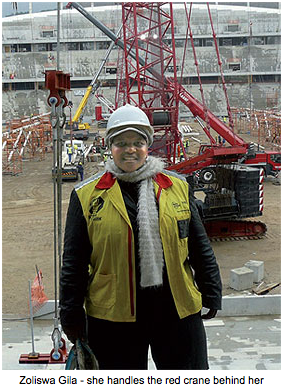 2010 Green Point Stadium in Cape Town.
2010 Green Point Stadium in Cape Town.
Gila, a 32-year old mother and wife, is the sole breadwinner for a household of six people. She operates one of the main cranes, which is 90 metres high, at the Green Point Stadium in Cape Town.
Dream job
Gila's dream was to become a pilot, but she couldn't afford the training. Her second option was to become a crane operator. "Being an operator allows me to be high in the sky. I'm just one step away from flying a plane."
Gila was unemployed for four years and things were very tough. She got her lucky break when WBHO, a major construction company, started looking for people to train in the industry. She applied without hesitation...after all it was her second dream job.
Only woman
"Many people applied, but the course was so tough that in the end there were only six women and 14 men. After one month and two weeks of training, I was the only woman who passed," Gila said. She's not scared of climbing the crane at all and loves being high in the sky. For her, it feels like being in a helicopter. "I have the best view of Cape Town." But being a crane operator is very difficult. You must be very responsible and know what you are doing, because your negligence could end up causing someone's death," she said.
Gila starts work at 7 o'clock in the morning and sometimes only finishes at 8 o'clock or 11 o'clock at night. She works overtime to make enough money to survive every month.
Respect
When she started working at Green Point Stadium in July 2007, some men were rude and didn't want to work with her. "They said I would kill them because I didn't know how to operate the crane." Instead of being put off, she decided to work even harder. Without any incident or accidents on her record she won their respect.
She loves her job and is proud to be on the 2010 team. "I'm so proud of myself for getting this far. I can't wait to see the completed job so that I can point my finger
Hard work
Gila has not given up on her dream to become a pilot and will continue working towards it. "I will fight until that dream comes true," she said.
Her advice to people from disadvantaged communities is: "stand up, don't beg, work hard and your dreams will come true. Sometimes people will try to stop you or make you feel like you are not good enough, but you are!"
- Staff Reporter
REAPING THE FRUITS BEYOND 2010
REAPING THE FRUITS BEYOND 2010 sadminLong after the 2010 FIFA World Cup has gone, many communities will still be reaping the fruits of South Africa having hosted this event. Among those who will benefit is wheel-chair bound Nonhlanhla 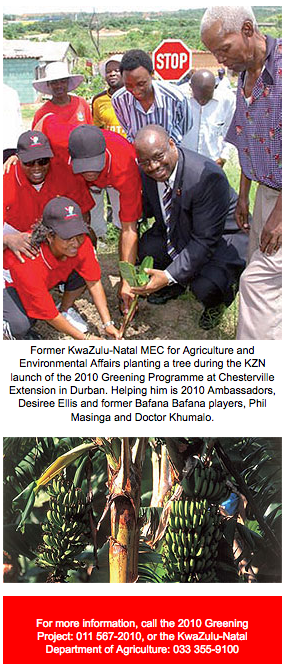 Mzila.
Mzila.
Nonhlanhla Mzila is a member of one of the thousands of communities who have benefited from the Government's housing programmes.
Now she is reaping the fruits of the 2010 Greening Programme as fruit trees are planted in communities to give them food, shade and beauty.
Nutritious fruit
Mzila, who is from Chesterville Extension outside Durban in KwaZulu-Natal, lost her job after she became disabled about two years ago. Since then she has been struggling to find another job.
She is very pleased that the trees will help her to feed her family by providing them with nutritious food. At the same time, it will add beauty to their home.
Food security
The programme is one of the Legacy Projects of the 2010 World Cup Organising Committee.
The Department of Water and Environmental Affairs, working with the Parks Departments of the host cities, are responsible for the 2010 Greening Programme.
The programme aims to provide food security in the long-term, while also marking South Africa's hosting of the 2010 World Cup Soccer.
The various parks departments give communities guidelines on how to plant the seedlings and care for their trees.
Seedlings
Through the programme, thousands of avocado, macadamia nut and banana trees were given to households in low-cost housing settlements.
KwaZulu-Natal South Coast households got macadamia nut and banana tree seedlings. Households in Chesterville Extension and Ndaleni Village got avocado pear seedlings.
In Soweto, the Johannesburg City Parks department planted trees in parks at Mapetla and Mofolo Parks as part of the Greening Soweto 2010 Legacy Project.
Soweto
Since the Greening Soweto Project started in September 2006, more than 50 000 indigenous trees have been planted along the streets of South Africa's largest township.
Greening Soweto aims to plant more than 300 000 trees in the township. More trees will help to beautify the landscape and create public places that bring pride and joy to residents. In addition, it will give children pleasant places to play close to their homes.
- Mbulelo Baloyi
SAVE IT! DON'T WASTE IT
SAVE IT! DON'T WASTE IT sadminGovernment's efforts to encourage all sectors of society to work together to save energy, is showing results.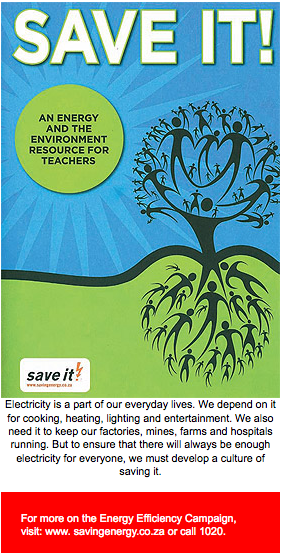
Various programmes have been started to make South Africans, including large industries like steel companies and mines, aware of the importance of saving energy.
Government working with Eskom started campaigns on radio, television and newspapers. These included useful information and energy-saving tips.
Schools
Working together with Eskom's schools programme, the campaign has been taken to schools in the form of road shows. During road shows, learners participated in fun activities like energy-efficiency games.
The schools programme resulted in a campaign called Save It! To help learners understand the Save It! campaign, government published a booklet with lessons on energy saving. It is mainly aimed at learners between Grade 4 and Grade 7.
Teaching syllabus
The Save It! booklet will form part of the teaching syllabus in schools. With the help of the booklet, learners will learn how electricity and other forms of energy work. They will also learn that certain types of energy like coal burning causes pollution, which is dangerous to the environment and to our health.
The booklet helps teachers to give learners the necessary skills and values to be energy wise.
Champions
In December last year, government also started the Summer Energy Saving Campaign. It was aimed at giving tips and advice on saving energy during the summer holiday period.
As a follow-up to the summer campaign, government started a campaign called Energy Saving Champions. It involved some famous South Africans, including actors and sporting greats to promote a culture of saving.
They focused on creating national awareness about saving electricity by being energy-saving role models.
Energy Addiction
In April, a new awareness programme was added called Energy Addiction.
The first part of the campaign aims to make South Africans aware that they sometimes use electricity without even thinking. One example is leaving your cellphone charger in the plug after charging it.
The Energy Addiction campaign carried advertisements in the media and on advertising boards showing "energy addicts".
The campaign encourages South Africans to stand together and think about their energy-using habits. It encourages them to take steps to get rid of their "energy addiction", similar to the road to recovery for substance addicts.
- Mbulelo Baloyi
SURVIVING THE ECONOMIC SLOW-DOWN
SURVIVING THE ECONOMIC SLOW-DOWN sadmin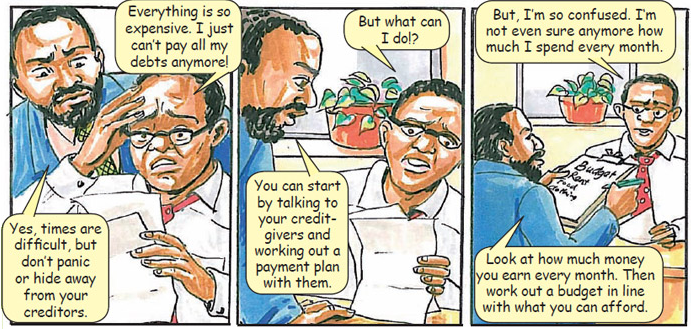
The economic slow-down is making it difficult for everyone to survive. Many things have become more expensive. People are struggling to pay off their debts and meet their basic needs. If you have fallen into the debt trap, you must not panic or hide away from your creditors. Accept that you have debt and make a plan to deal with it as soon as possible. Never take a loan to pay off another loan. This will just get you into more debt.
Tips to help you
- Don't ignore your debt
There are many factors that can prevent you from paying your debts. These include things like losing your job, the death of a family member, high interest rates and high food prices. But you must never ignore your debt.
If you lose your job, tell your credit-givers. Talk to them about a payment plan. Explain your situation and tell them what you can afford to pay off every month.
If you get a retrenchment package, use some of the money to pay off your debts. You have the right to settle your debts earlier than the agreed period.
- Budget and pay your debt
Draw up a budget in line with the money that comes into the household. You can also keep a spending diary - write down every cent you spend for the month. This will help you to see where you can cut down on your spending.
Stick to your budget and start paying off your debt, even if it's small amounts. This will be important in the future when you need a loan to buy a house or a car.
- Cut down your expenses
If you haven't got enough money to cover your expenses, see where you can cut down on your spending. Shop around for the best deals like special offers. Planning will help you a lot. Start by buying only what you really need.
- Start saving today
Plan to save every month. Putting money aside will help you in emergency situations like when you lose your job, have an accident or lose a family member. It is important to follow your savings plan. Cut out unnecessary expenses like cigarettes and alcohol or clothes and luxury items which you don't really need. Look out for bargains and buy in bulk once a month instead of buying small amounts every week.
- Don't buy on credit
Instead of buying on credit, save money until you can afford to pay cash.
- Carol Netshifhefhe
For more information, call the National Credit Regulator: 0860 627 627 Department of Trade and Industry: 0861 843 384 Financial Services Board: 0800 110 443
UIF TO THE RESCUE
UIF TO THE RESCUE sadminThe world-wide economic slow-down is also affecting South Africa. Government is putting plans in place to deal with problems facing our 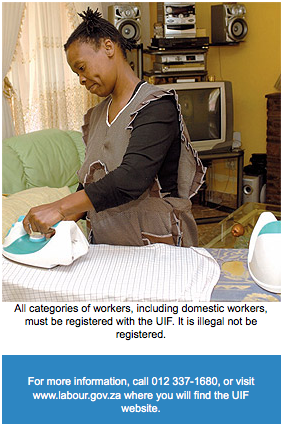 economy and to speed up economic growth. But in the meantime, many people have lost their jobs. The Unemployment Insurance Fund (UIF) is one programme which is coming to the rescue of such workers.
economy and to speed up economic growth. But in the meantime, many people have lost their jobs. The Unemployment Insurance Fund (UIF) is one programme which is coming to the rescue of such workers.
The UIF is a fund to which employers and workers contribute a small sum of money every month. The purpose of the Fund is to help workers who lose their jobs.
However, the UIF only pays out workers who are registered and who have contributed.
Benefits of the UIF
The UIF will pay a monthly sum to unemployed workers for a certain period of time. This gives the unemployed person time to look for another job.
The maximum period is eight months, but the length of time depends on how long the person has contributed to the UIF. The money that is due to a worker who has been contributing to the UIF is worked out on a four-year cycle. The UIF pays workers according to the number of weeks they have worked. For example, for every week that a person works they get one day credit with the UIF. A person who had been working for two years, gets 119 credit days. This means the UIF will pay the worker for four months.
Responsibility
All South African workers who work for a period of more than 24 hours a month should be registered with the UIF. It is the responsibility of both employers and workers to make sure that they are registered.
It is illegal not to be registered with the UIF. Therefore, all categories of workers, including domestic workers should be registered.
The only workers who do not have to be registered by the UIF are civil servants, people who work less than 24 hours a month, workers who are employed on a learnership basis only, and contract workers who earn their salaries on a commission basis.
Register
The benefits of ensuring that workers are registered with the UIF are paying off. More and more workers who have lost their jobs are surviving on UIF payments during this difficult period in the country's economy.
Make sure that you are registered and make sure you register your workers.
- Mbulelo Baloyi
UIF: WHAT YOU SHOULD KNOW
UIF: WHAT YOU SHOULD KNOW sadmin The UIF provides short-term financial relief to workers when they become unemployed, or are unable to work due to certain conditions. The 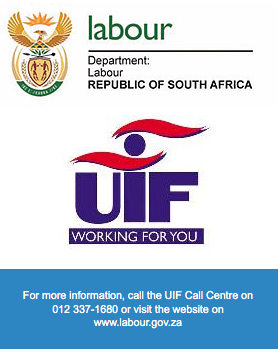 Fund gets its contributions from workers and employers. One per cent (1%) from the worker and one per cent (1%) from the employer, the total contribution payable to the UIF by the employer must be two per cent (2%).
Fund gets its contributions from workers and employers. One per cent (1%) from the worker and one per cent (1%) from the employer, the total contribution payable to the UIF by the employer must be two per cent (2%).
Workers who contribute to the UIF
Since 1 April 2002, all workers who work for 24 hours or more per month, must contribute to the Fund.
As from 1 April 2003, the Unemployment Insurance Act requires domestic workers and their employers to contribute to the Fund.
UIF offers the following types of benefits:
- Unemployment benefits
- Illness benefits
- Maternity benefits
- Adoption benefits
- Dependants (death) benefits
Workers who do NOT contribute to the UIF
- Workers who work less than 24 hours per month
- Public servants as defined under section 1(1) of the Public Service Act, 1994
- Workers who get a monthly state social pension, but excluding a disability or maintenance grant.
- Workers who have an employment contract with an employer for the sole purpose of entering a learnership agreement.
- Workers who are paid only on a commission basis.
- Currently, foreign workers who do not have a 13-digit bar-coded South African identity document, or who do not have a work permit.
NB
UIF does not pay workers who resign and/or abscond (run away) from their employment. In other words those employees will lose their benefits.
All employers who employ any staff and pay them either in cash or in kind must register with the Fund as soon as they start activities as employers. It is the responsibility of the employer to register the business and deduct the necessary amounts from the workers' pay. Employers who fail to do this may be fined in terms of the Unemployment Insurance Contributions Act, 2002.
All commercial and domestic employers must by law declare the status of employment of their workers, or any changes made regarding their workers' information. These changes must be made on a prescribed form UI 19. It can be obtained from Labour Centres in all the provinces.
Take Note
If your employer refuses to register you with the Fund and does not make the required deductions, you may contact your nearest office of the Department of Labour.
When applying for UIF benefits, workers should give their own banking details to prevent fraud and corruption. Applicants should make their applications for the benefits within a period of six months after they lose their jobs. When workers start working again they should inform the Department of Labour.
Working and drawing UIF benefits at the same time is an act of fraud. It is an offence, which is punishable by law.
VUVUZELAS GOING GREEN FOR 2010
VUVUZELAS GOING GREEN FOR 2010 sadminSouth Africans are getting ready to become the centre of the world for four weeks in 2010. This is when we will showcase the mother of all soccer games - the FIFA World Cup. Among the many benefits of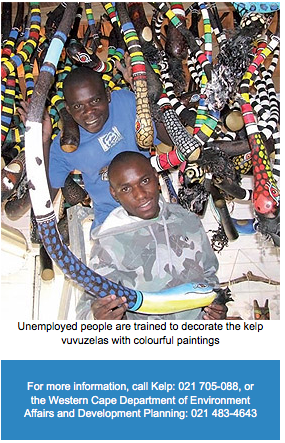 the World Cup for South Africa, are some special 2010 programmes. Green Goal Action is a 2010 programme aimed at protecting the environment in 2010 and beyond.
the World Cup for South Africa, are some special 2010 programmes. Green Goal Action is a 2010 programme aimed at protecting the environment in 2010 and beyond.
Green Goal Action is an official 2010 FIFA World Cup greening programme. It aims to help people make the event as environmentally friendly as possible.
As part of the city's Green Goal Action, a programme was started in Cape Town to produce a special kind of the vuvuzela. The city's Green Point stadium is scheduled to host eight games including a semi-final.
Kelp
The vuvuzela is loud, and it's proud, and it's part of South African soccer culture. It is so important that special permission was given to allow it into stadiums during the 2010 World Cup.
This truly South African 'trumpet' is usually made from plastic. But it is hoped that the latest environmentally-friendly vuvuzelas, will be just as popular. These vuvuzelas are made from kelp, a large brown seaweed that is found all along South Africa's coast.
School project
The man who started the kelp vuvuzela project is graphic designer and illustrator, Adam Carnegie.
He said the idea of making kelp vuvuzelas for 2010, came from his son's school craft project. "We had to come up with an idea where all the children in the class could participate in a craft project to raise funds at a school fete," he said.
He had seen the decorated kelp horns before and thought it would be a good project for the entire class. The horns turned out to be very popular at the school fete and were quickly sold out.
Creating jobs
Carnegie realised that these horns could also be popular among tourists, especially during the 2010 World Cup when more people are expected to visit the country. He saw it as a business opportunity that would create jobs. At the same time it would develop skills and teach people about the environment. His idea led to the Kelp Environmental Learning Project, also known as Kelp.
The project grew so big, that he moved his workshop from his home to a shop in Kommetjie. Here he employs many unemployed men and women. He trains them to paint decorations on the kelp horns.
Works of art
Kelp, collected from local beaches, come in different shapes and sizes. Before painting on the kelp it is dried out in the sun. The horns are then transformed into colourful works of art, each one with its own special shape and patterns.
"I'm hoping that tourists will buy these beautiful works of art and take them home to remind them of South Africa," Carnegie said.
- Aisha Ismael
WE CAN ACHIEVE ANYTHING
WE CAN ACHIEVE ANYTHING sadminKhathutshelo Kwinda was born blind, but it has never stopped her from living a full life. She believes that there is nothing wrong with blindness. Blind people can achieve anything they desire, because they 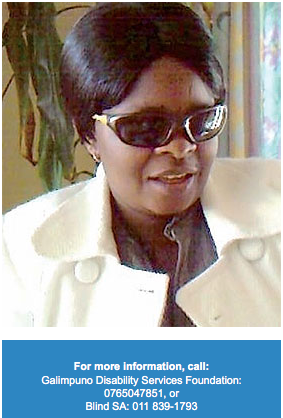 are not mentally blind. This is why she is helping other blind people to reach their dreams.
are not mentally blind. This is why she is helping other blind people to reach their dreams.
After leaving school, Khathutshelo Kwinda couldn't afford to further her studies. While in Grade 11 she had to drop out of school. Her family could no longer afford the fees for the special school she attended due to her blindness. She had to study at home to finish Grade 12. Although she couldn't fulfil her dream of studying for a degree, Kwinda didn't give up.
She believed she could make a success of her life and wanted to make a difference in other people's lives. After finishing school in 1996, she helped Blind SA to open a branch in Limpopo where she grew up. She worked hard and became chairperson of the branch.
Disability Foundation
business called Galimpuno Disability Services Foundation. She started the foundation because she wanted to empower other blind and partially sighted people.
The foundation now has offices in four provinces, namely Gauteng, Limpopo, Mpumalanga and North West. It works with the provincial governments and municipalities to identify children with special needs. It helps these children through school and with other projects like skills development.
With the co-operation of the Department of Labour, the foundation also helps disabled students to get funding to go to school, further their studies or fund other projects.
Through the foundation, Kwinda visits special schools where she talks to learners to make them aware that disability can be overcome.
Useful information
Blind and partially sighted people get help from the foundation in the form of things like learning materials and support to start their own businesses. The foundation also provides Braille literature books and calendars.
In addition, it gives useful information about what is happening in the country like the 2010 World Cup and other sporting events, elections, acts of parliament, legislation, adult basic education and Braille training.
Braille magazine
Another project run by Kwinda is a Braille magazine called Galimpuno Braille Magazine. The magazine is quarterly and is published in both Braille and print. It is free of charge and distributed in Gauteng, Limpopo, Mpumalanga and North West.
The main aim of the magazine is to inform blind people about what is happening around them. The stories in the magazine are written by blind and partially sighted people.
Construction
In addition to all her other projects, Kwinda also has a construction company. The company has worked with the Department of Housing to build RDP houses.
With her positive attitude to life, Kwinda is an inspiration to others and an example of her motto: "We can achieve anything."
- Carol Netshifhefe
YOUTH MUST BE ROAD-SAFETY AMBASSADORS
YOUTH MUST BE ROAD-SAFETY AMBASSADORS sadminThe cost of road accidents in South Africa amounts to more than R46 billion per year. Young people can play an important role in reducing 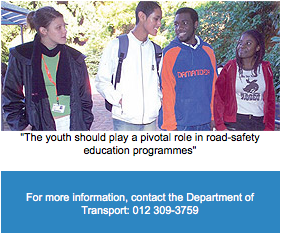 accidents by being road-safety ambassadors. The Department of Transport has therefore called upon the country's youth to get training in scare skills relating to transport and road safety.
accidents by being road-safety ambassadors. The Department of Transport has therefore called upon the country's youth to get training in scare skills relating to transport and road safety.
The youth must remember that they make an important contribution to the country's social and economic development. This was Transport Minister, Sibusiso Ndebele's message to the youth ahead of Youth Day celebrations in June. He said being cautious in their daily lives should be a priority.
Among other things, young people must be aware that actions like speeding, reckless driving, drunk driving and skipping red traffic lights can lead to death. In this regard they have a responsibility to set an example to other people, especially small children who look up to them as role models. "The youth should play a pivotal role in our road-safety education programmes...," Ndebele said.
Responsibility
In line with some of the key messages during Youth Day celebrations, the Department of Transport encourages young people to take up opportunities in the transport sector, both in terms of business and careers. The department is investing in the training of youth in scarce skills relating to transport and road safety. Scarce skills in these sectors include railroad artisans, civil engineers, traffic officers, pilots, air traffic controllers and aeronautical engineers.
Training
In co-operation with other organisations, the department is currently training 150 rail artisans, 34 civil engineers, 40 air traffic controllers and 420 pilots. They are also training 10 medical doctors, 5 764 traffic officers, 20 students in road construction, eight ship surveyors and 15 civil engineers.
- Carol Netshifhefe